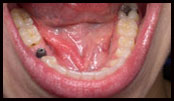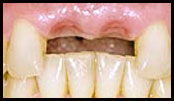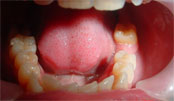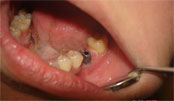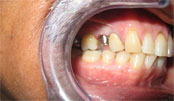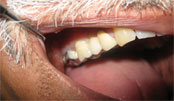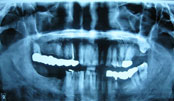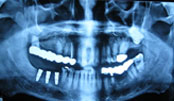When a tooth is missing, a dental implant takes the place of the missing root and a prosthetic crown replaces the natural crown.
The gum tissue is opened to expose the bone area where the implant will be placed. In situations where there is insufficient bone structure, bone grafting may be a recommended procedure.
The implant procedure is a surgical placement of the implant in your jaw bone which requires a three to six month healing period before the implant restoration (crown) will be placed. During this healing time, the bone grows in and around the titanium implant creating a very strong support. commonly referred to as ossteointegration.
So long as you have enough bone in the area of the missing tooth to facilitate the anchorage of the implants, this procedure can yield terrific results.
Dental implants can be rejected. Usually they are replaced with another implant of a slightly larger size. The rejection or "failure" rate is minimal, only 1 to 2% of all implant procedures.
A Flipper, a false tooth attached to an acrylic denture base, temporarily takes the place of a missing tooth before the permanent crown is placed on the implant.
Dental implant is recommended for treating patients who only have one missing tooth or multiple missing teeth. Denture wearers often suffer due to loose dentures, and dental implants may offer many benefits to such patients who have no teeth of their own. The stability of the dentures is improved with the use of even two dental implants with attachments, the procedure can also help to preserve the patient's jaw bone and retard the shrinking of the jaws that is routinely seen in long-term denture wearers.
The benefits of Dental Implants can be quite dramatic in patients of all ages with loose, missing, or decayed teeth, which have occurred either naturally or through an accident. Whether the choice for this type of treatment is made for oral health or simply cosmetic reasons, there is absolutely no substitute for the gift of a healthy, attractive smile. Without question, it affects self-esteem, job performance, energy levels and social interaction.
